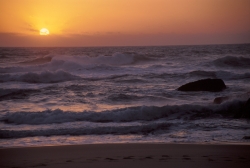|
The official portugal tourrism site is Portugal InSite
Getting There And Around:
Air - Great airfairs can be booked directly through Orbitz using the fair scheduler in 21st Century Adventures Locations
By Rail - Should you wish to travel around Portugal by train, you will always be able to enjoy the valuable help of the national railway company CP - Caminhos de Ferro Portugueses.
Rental Cars - At Portugal`s airports, international railway stations and transport terminals, and in all major towns and cities, there are self-drive rent-a-car services. For drivers who have motor disabilities, specially adapted cars are available, as well as cars with automatic gear-boxes.
In order to rent a car, you must:
- be over 21
- show some identification (identity card for EU citizens or a valid passport for citizens from other countries)
- have had a valid full driving licence for over a year.
Where To Stay:
Orbitz -
Villa Rentals - through Elysian Holidays
Activities:
Beaches - With its 850 Km of Atlantic coastline Portugal offers a mild climate all year round and a wide variety of different beaches. In the extreme north west of Portugal, the waves are higher, in the south west beaches are long and sandy and in the south the water is calm the water is transparent.
Parks & Reserves - Classified as either National Parks, Nature Reserves, Protected Landscape Areas or Classified Sites, there are a number of very special areas in Portugal that are quite distinct from one another.
Other - Shopping in open air markets and at village festivals, regional cultural displays and crafts and historical buildings, sites and museumsopportunities abound.
What To Take:
Rain jacket, comfortable clothing that doesn't wrinkle and will be appropriate for the activities you wish to participate in, camera and film. The climate in Portugal varies significantly from region to region, and is influenced by such factors as relief, latitude and proximity to the sea.
The regions closest to the sea, especially those in the south of the country, and, of course, the Algarve most notably, have mild winters. In the regions of Porto and Northern Portugal, and the Beiras, especially in those areas closest to Spain, the winters are colder, although temperatures are still quite moderate when compared with the rest of Europe. There is some snowfall, most frequently in the Serra da Estrela, where the highest point in Mainland Portugal is to be found (1991m) and where there are special facilities for skiing.
Summers are hot and dry, especially in the inland regions (the north-eastern region of Trás-os-Montes and the Alentejo), whilst, on the coast, the heat is softened by the influence of the sea. During Autumn, there are frequently sunny days with mild temperatures, and, when such a period occurs at the beginning of November, it is popularly referred to as being a "St. Martin´s Summer", so called because of its proximity to this saint´s day (11 November).
About The Author
|
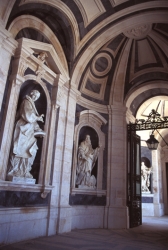 A spring visit to Portugal can be a tranquil respite in these turbulent times. It can also provide a holiday that is easy on one's budget. April on the Lisbon coast, when the weather is balmy and before the summer tourists arrive, is perfect. A spring visit to Portugal can be a tranquil respite in these turbulent times. It can also provide a holiday that is easy on one's budget. April on the Lisbon coast, when the weather is balmy and before the summer tourists arrive, is perfect.
Instead of staying at a hotel, live it up, rent a villa! The magazine "In Britain" is an excellent source for villas and holiday flats to "let". Another resource is the internet where you can find a wide range of accommodations and surely a place to suit your budget. We found that staying in an off the beaten path town or village is much more economical that staying in a city and we enjoyed mingling with the friendly locals as we shopped at the village market. What a treat to buy fresh baked breads! Local wines were delicious and cost so little. Our village was Almoçageme, just an hour's drive by rental car from the Lisbon airport but worlds away from the city's crowds and chaos.
Rental cars are reasonable in Portugal. They have become slightly more expensive since the introduction of the Euro; all prices seem to have been rounded up. (On the plus side - it is now much easier to calculate and compare costs when visiting from other continents.) Fuel, however, is very pricey but distances are short and most vehicles are quite economical. Now driving, that in itself is an adventure! Country roads are narrow and winding. A mirror extends from the top of a wall at every bend but once you realize that each mirror will reveal what's around the corner you can relax without fear of a too close encounter.
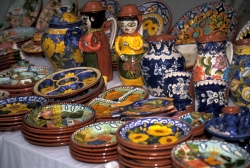 The porch of our villa looked out over a charming pastoral scene with the ocean in the distance. It provided an amazing panorama of sunrises and sunsets. Several of our days we just stayed "home" for a quiet time of reading and enjoying our view. Other days we ventured forth. The porch of our villa looked out over a charming pastoral scene with the ocean in the distance. It provided an amazing panorama of sunrises and sunsets. Several of our days we just stayed "home" for a quiet time of reading and enjoying our view. Other days we ventured forth.
One day we drove to a nearby rail station, parked the car and took the train to Lisbon, thus avoiding the horrors of driving and parking in the city. It was a chilly, drizzly day so we visited the wonderful Palácio de Belém and the equally marvelous Monsterio dos Jerónimos paying only a small admission for each. At noontime we wandered the cobbled streets of the Alfama perusing the menus hung outside each neighborhood café. When we found one that suited our tastes we stopped for lunch. Their tasty homemade fish soup, a crisp salad and coarse Portuguese bread warmed us through. Following the meal we walked to a nearby train stop and boarded the local electric train to return to the railway station where we were to catch the train out of Lisbon. We knew we must buy tickets and we knew the price but we didn't know how to purchase them. We climbed onto the train. Unfortunately none of the nearby passengers spoke English so we stood in the aisle, fares in hand and tried to pay the conductor who came along and asked for our tickets. With much gesturing two uniformed men took hold of us and would not allow us to get off at our stop. They escorted us to an office two stops beyond ours where we paid our coins and then had to purchase tickets to return to our rail station. The adventure gave us a chuckle! If only we'd spoken Portuguese!
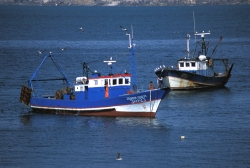 Another day we ventured to Sintra, a city which boasts a fascinating Sunday market. At the market entry a couple of Andean troubadours preformed. Beyond their music a cacophony of squawking ducks, hens and geese voiced complaints at being held in small wooden crates. The larger poultry would soon become dinner while the smaller would be raised to produce eggs. Crowds of people checked the many stalls. Some were haggling over carpets. Others were buying candy. Licorice came in at least twenty varieties! Additional stalls sold everything from clothing, to linens, to ceramics and pots and pans. Happy smiles reflected the mood of families enjoying a Sunday outing. Instead of snacking at the market we found a charming restaurant where we lunched on the popular Portuguese dish, bacalhau, which combines salt cod, potatoes and onions in a white sauce. Complemented by a nice dry white local wine the meal was food for the gods. Another day we ventured to Sintra, a city which boasts a fascinating Sunday market. At the market entry a couple of Andean troubadours preformed. Beyond their music a cacophony of squawking ducks, hens and geese voiced complaints at being held in small wooden crates. The larger poultry would soon become dinner while the smaller would be raised to produce eggs. Crowds of people checked the many stalls. Some were haggling over carpets. Others were buying candy. Licorice came in at least twenty varieties! Additional stalls sold everything from clothing, to linens, to ceramics and pots and pans. Happy smiles reflected the mood of families enjoying a Sunday outing. Instead of snacking at the market we found a charming restaurant where we lunched on the popular Portuguese dish, bacalhau, which combines salt cod, potatoes and onions in a white sauce. Complemented by a nice dry white local wine the meal was food for the gods.
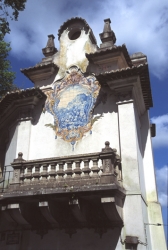 We visited the royal palaces in Sintra, in Queluz, and in Mafra. Each is an elegant monument to the wealth supplied by colonial Brazil in the 18th century. Excellent Portuguese craftsmanship is evident throughout the buildings but particularly in the brightly decorated tiles used throughout the country. In Queluz they were even used to line the walls along the canal. When I found tile murals (azulejos) for sale at a craft market at Mar do Inferno I couldn't resist buying one, an 18th century style vineyard harvest, for my kitchen, and another, an underwater tropical fish panel for my bathroom. They were so reasonable and so unique that even the hassle of carrying them home was worth the trouble! We visited the royal palaces in Sintra, in Queluz, and in Mafra. Each is an elegant monument to the wealth supplied by colonial Brazil in the 18th century. Excellent Portuguese craftsmanship is evident throughout the buildings but particularly in the brightly decorated tiles used throughout the country. In Queluz they were even used to line the walls along the canal. When I found tile murals (azulejos) for sale at a craft market at Mar do Inferno I couldn't resist buying one, an 18th century style vineyard harvest, for my kitchen, and another, an underwater tropical fish panel for my bathroom. They were so reasonable and so unique that even the hassle of carrying them home was worth the trouble!
Dining was a treat throughout our holiday. Each restaurant served numerous varieties of fresh fish. Often, if I enquired about a menu item the waiter would hurry away and return quickly with the whole, uncooked fish just to show me exactly what it was. I was surprised to discover that my order of "shrimps" arrived at the table cooked but with the entire creatures on my plate and I was a little unnerved by the black beady eyes staring up at me. My favorite meal was clams in a garlic sauce at the Da Andraga Restaurante on the beach of the same name. The sauce was so good that I mopped up every last bit with the fresh country bread. We returned to that restaurant several times. Although we prepared breakfast each day and a few other meals it was fun to seek out unique restaurants, many with breathtaking views. We were never disappointed in the fare and could hardly believe how economical the food was.
All too soon my two-week holiday in Portugal came to an end but the pleasant ambience will always linger in my memory. I highly recommend it as an affordable destination for your next vacation.
[ Awards ] [ Press Information ] [ Advertising ] [ Editorial Information ] [ Contact Us ]
ISSN: 1525-2930
Copyright © 1995 - 2013 21st Century Adventures
Systems and Server Space Provided by 10E Design
|






